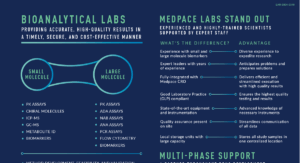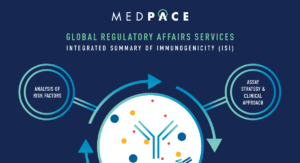
Immunogenicity/ADA Assays
Medpace Bioanalytical Laboratories routinely perform anti-drug antibody (ADA) assays supporting the development of large molecule drug candidates. A large molecule drug, such as a protein or antibody therapeutic, may elicit the immune system to produce antibodies against the drug. ADA assays detect these anti-drug antibodies. Patients that elicit an antibody response will have dramatically different responses, from no observable clinical consequences to life threatening reactions. Any ADA that might bind the protein therapeutic could neutralize the drug, but it could also be cross reactive with endogenous proteins, inhibiting their function. To determine if ADAs are neutralizing to a drug, Medpace Bioanalytical Laboratories can conduct a neutralizing antibody (NAb) assay in our dedicated BSL II lab.
Because anti-drug antibodies may affect the safety and efficacy of the drug, immunogenicity assays are typically a required component of clinical studies for large molecules. Immunogenicity studies are usually performed by exposing the drug to a population of patients or animals and then screening the subject’s serum for the presence of antibodies against the drug. These assays are typically conducted using ELISA or ECLA (such as the MSD platform). Medpace Bioanalytical Laboratories has two state-of-the-art ECLA platforms and 3 ELISA plate readers. Because immunogenicity assays are so critical to the safety and efficacy of a drug candidate, sponsors need to ensure that their assays are performed correctly and efficiently. With one of the highest ratios of PhDs to total staff in the industry, sponsors can be assured that their studies are conducted to the highest standards.
Preclinical Immunogenicity/ADA Assays
Medpace Bioanalytical Laboratories can support all stages of drug development, including preclinical immunogenicity studies. An antibody response in animals is not always correlated to the immunogenicity in humans; however, immunogenicity data collected during a preclinical study could assist in the assessment of toxicity and pharmacology studies. In addition, toxicity risks derived from an antibody response in animals could be used to help monitor for those risks in a clinical trial.
Immunogenicity Assays for Clinical Studies
As a top 10 clinical CRO, Medpace has vast experience conducting clinical trials. As such, Medpace Bioanalytical Laboratories is well-versed in managing immunogenicity studies supporting these clinical trials. During the investigational new drug (IND) stage, the sponsor should provide the regulatory bodies with the rationale and strategy for testing immunogenicity as a component of the clinical trial. The strategy used should be based on a risk assessment of the product. Large molecule therapeutics without an endogenous counterpart often pose a higher risk than drugs with a redundant endogenous counterpart. In low risk situations, sponsors can bank patient samples and perform the bioanalysis when assays are developed.
Cut-Point – ADA Screening
The cut-point is the level of response which determines if a sample is positive or negative for immunogenicity and therefore is critical in the screening process for anti-drug antibodies. This is statistically determined using a group of naive subjects. The cut-point should be above the variability between naive samples. A variety of factors determine the method of establishing the cut-point, such as pre-existing antibodies, statistical outliers, and interfering factors.



